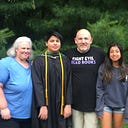Thanks to Charlottesville, We Know There is Life After Hate
Five years ago, I was disgusted by the terrorist actions we saw in Charlottesville. As a proud graduate of the University of Virginia, I was horrified to see the institution that has meant so much to me for so many years being used as a backdrop for hate. And as the father of two children of color, I was even more horrified to see that we stood before the world as a nation of hate, division, and ugliness.
I was also frustrated by the lack of a meaningful national address from then-President Donald J. Trump on the issue. Looking across history, we can see how the most challenging times have allowed our elected officials to truly lead. Instead, we saw a President blame both sides, while doing nothing to call out the hate, violence, and murder exercised as part of a procession of tiki torches, axe handles, and symbols of hate.
I was so frustrated and horrified and angry that I decided that if the President wasn’t going to say what needed to be said, then I would. I would use the meager platforms that I managed on social media to say something, anything, to bring a little clarity to an unclear time. And I was grateful for the tens of thousands who commented, shared, and reshared my reflections on Charlottesville, which can be found here: https://eduflack.com/2017/08/13/my-fellow-americans-reflections-on-charlottesville/
In the years since, it has been a moment that I truly have never been able to shake. In subsequent years, I would head to my alma mater — usually to speak to groups of Latino students on grounds — and felt compelled to revisit where those torches were lit and where the anger beyond comprehension erupted. I would walk grounds with my teenage son, pointing out to him the history of the Rotunda and feeling compelled to talk about that dark day. But in all that time, I never thought about how so many people were making good out of such a bad time.
Until earlier this year.
Many years before Charlottesville gave us a face for modern-day hate, a non-profit organization named Life After Hate was created. Founded by former members of the violent far right, Life After Hate was the first nonprofit in the United States to help individuals disengage from violent far-right hate groups and hateful online spaces. One can hear some of these “formers” who are part of Life After Hate share their stories here.
As we, as a nation, were still trying to sort out what happened in Charlottesville and how we could collectively respond, many turned to Life After Hate to show a path for what is possible. To show that even the most hardened believer of violent far-right extremism (VFRE) can leave the movement. That it is possible to disengage from far-right hate groups. That we, collectively, can combat violent extremism to establish safer and more-resilient communities. That there are ways to leave hate and violence behind. That those who are committed to change deserve a second chance.
What was once an organization of a handful of former members of VFRE helping others like them, became a national movement. Those looking to exit were provided access to licensed professionals who could help with the labor-intensive process. Services were provided for family and friends who wanted to do anything and everything to help loved ones exit the life of hate. Life After Hate became a beacon for those seeking to write a new chapter, learn from their past mistakes, and make right by their family and their community.
I believe in the work of Life After Hate and in the potential it has to ensure that there are no future Charlottesvilles in our future. So much so that I now have the honor and responsibility of serving as Life After Hate’s executive director, leading this important movement at a time when it and its work is still so needed.
Some like to say that Charlottesville lit a literal fire under VFRE, making it publicly acceptable for them to spew the sort of racial hate and anger that many thought was dead and buried. That may be true, particularly after witnessing events like January 6. But Charlottesville has also inspired a generation who are willing to do anything, and everything, possible to make sure that we are not a nation driven by intolerance, hate, and fear.
That is why groups like Life After Hate are committed to ensuring that those looking to get out of the hate movement have access to the professional counseling and support services they need. It is why we are providing educational and support services to friends and family. It is why we are working with the law enforcement community to address domestic terrorism. And it is why we are doing everything possible to help those who are seeking to help.
Five years after Charlottesville, we can now tell the stories of those from across the nation who have decided to experience a new life after hate. These “formers” now stand as inspirations for others, living the next chapters of their lives in ways that show that change and redemption are possible. As our nation continues to look to see if we have grown or learned anything from those ugly actions in Charlottesville, we can and should point to those I am proud to work with each and every day.
No one should be judged solely by the darkest moments of their life. Instead, we all should be viewed by the resilience we demonstrate, our ability to acknowledge our personal failures, and our ability to learn from it and change as a result of it. There is a life after hate. It just took Charlottesville to help many of us see — and show — that. That is what we should reflect on five years later.
